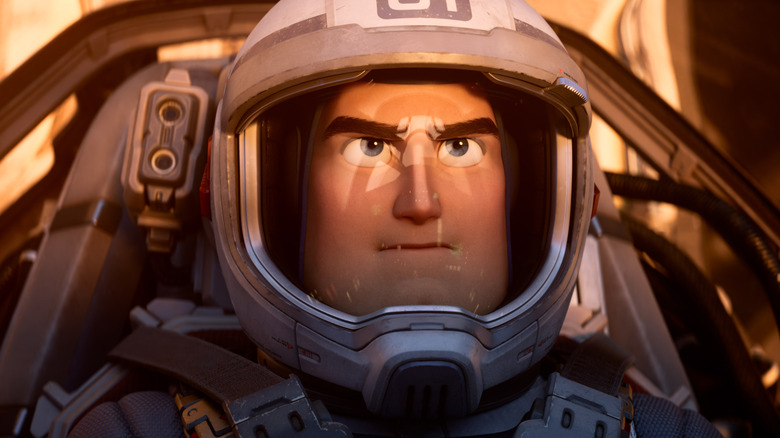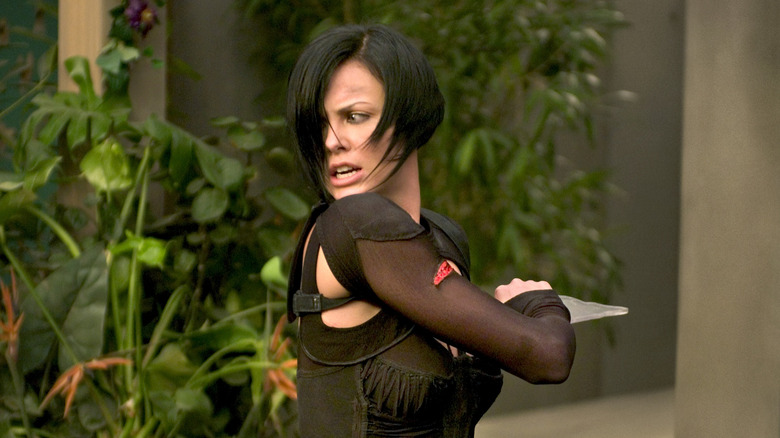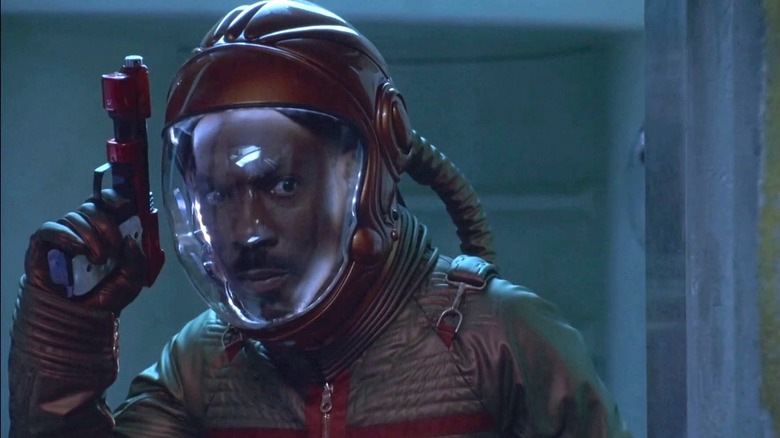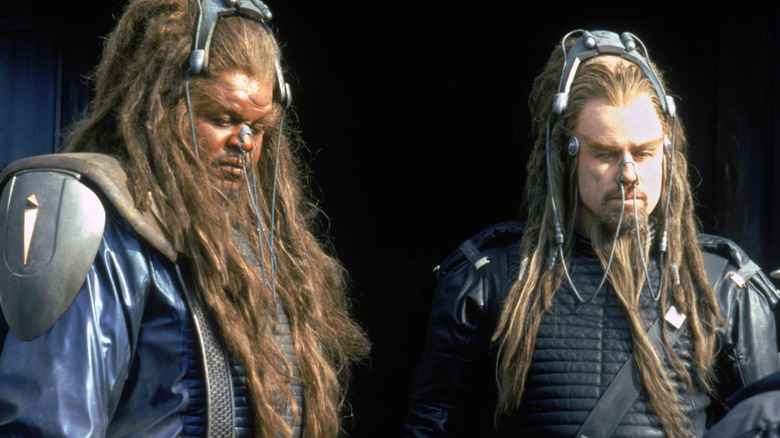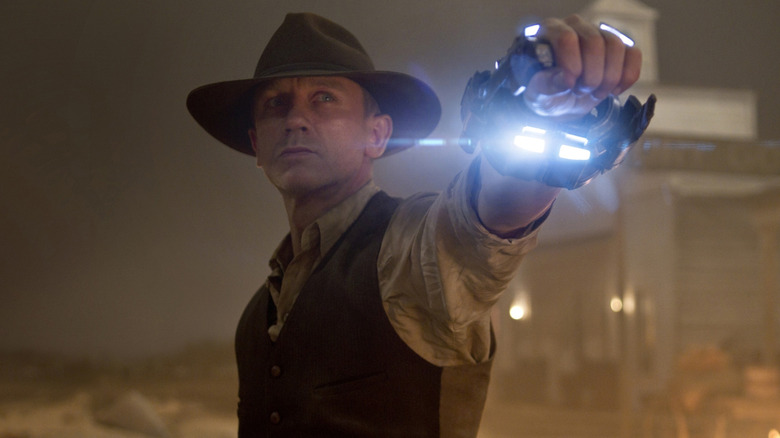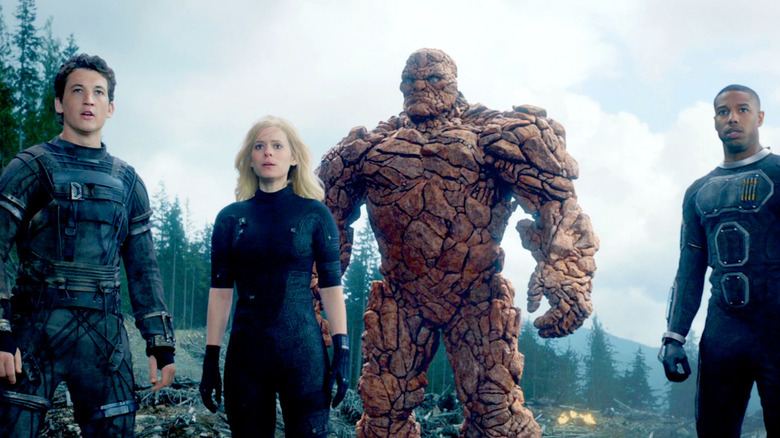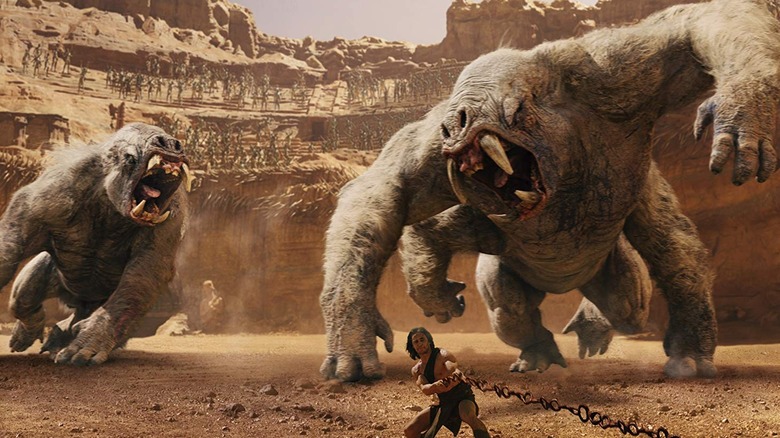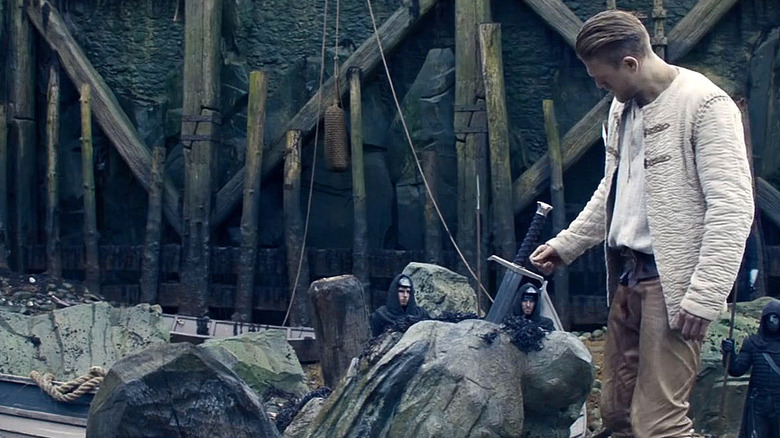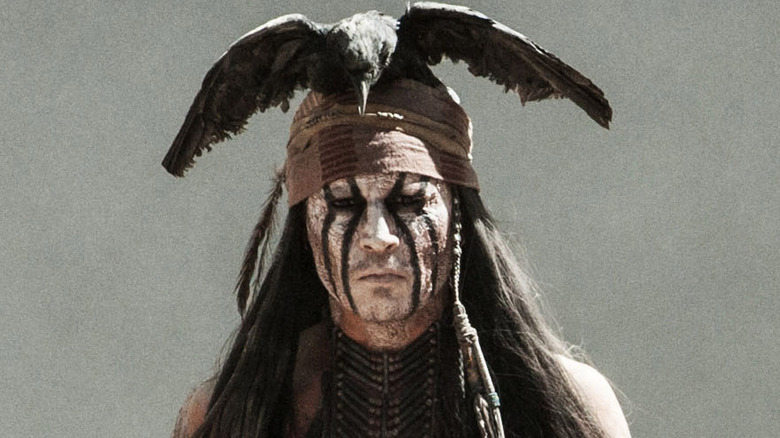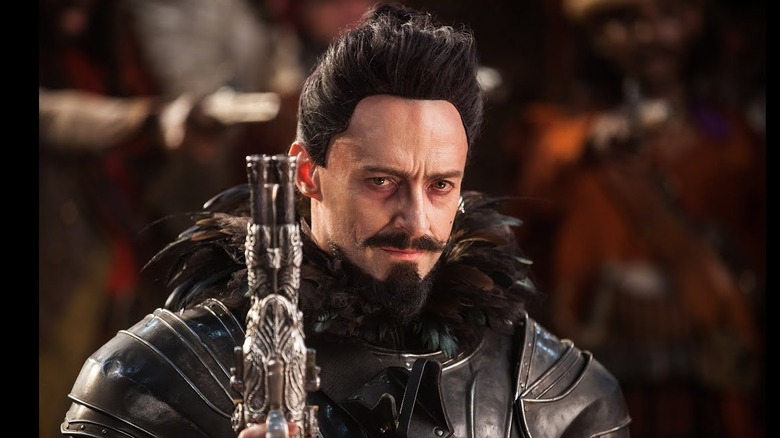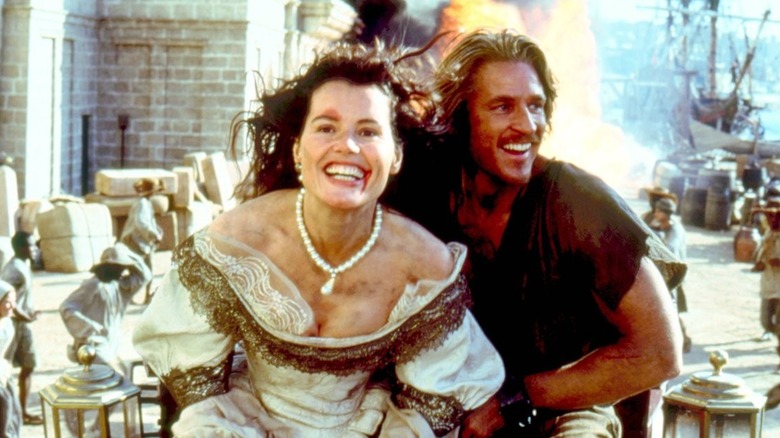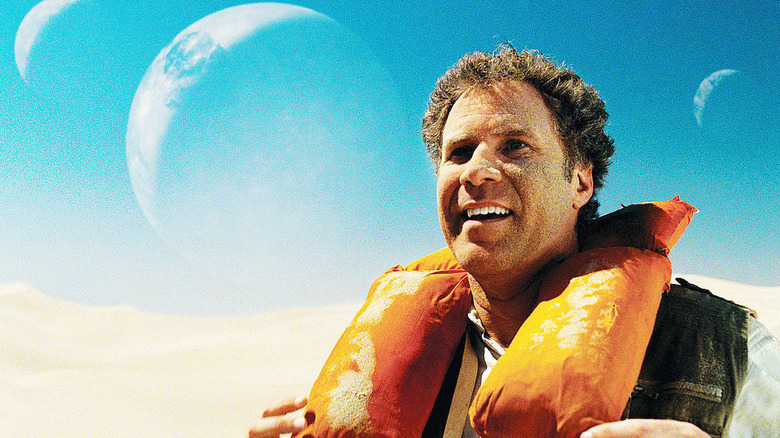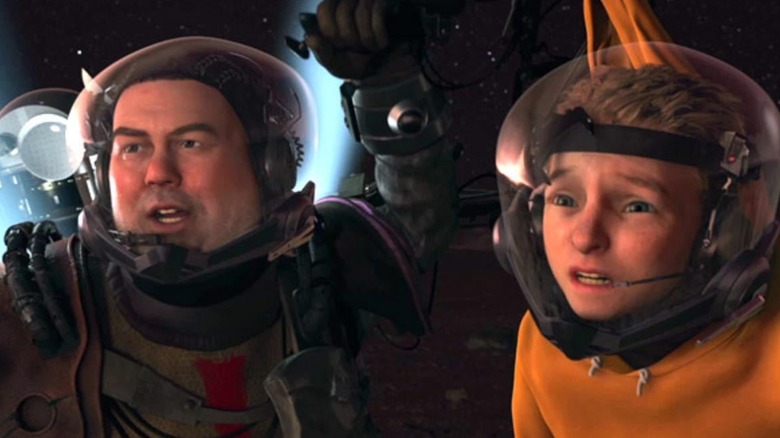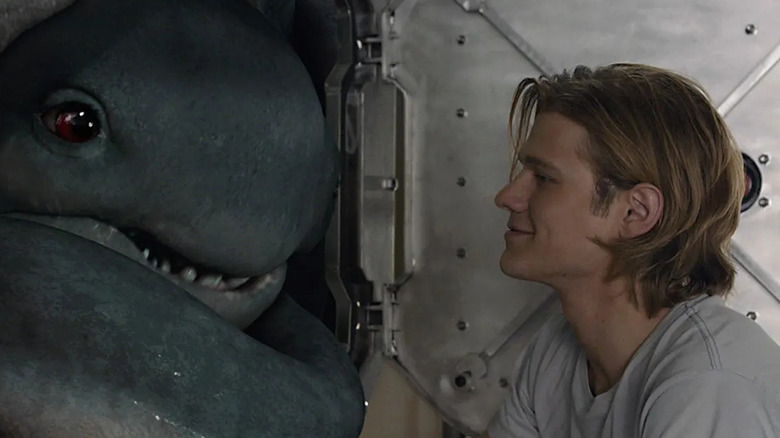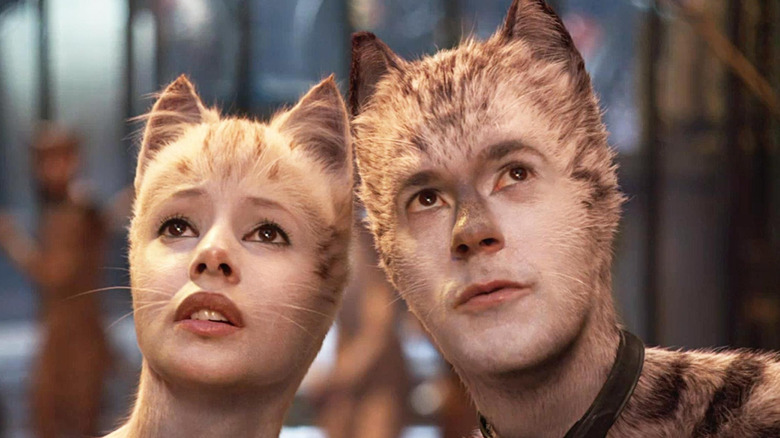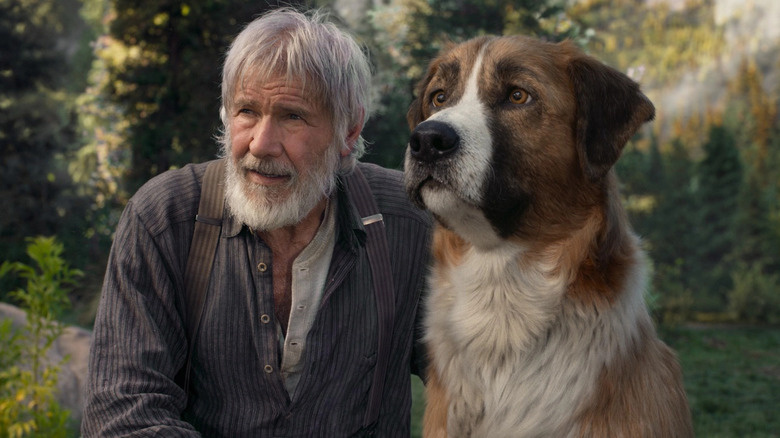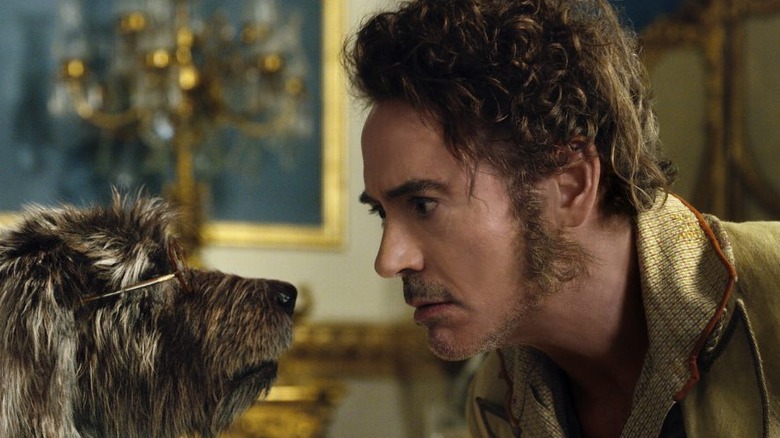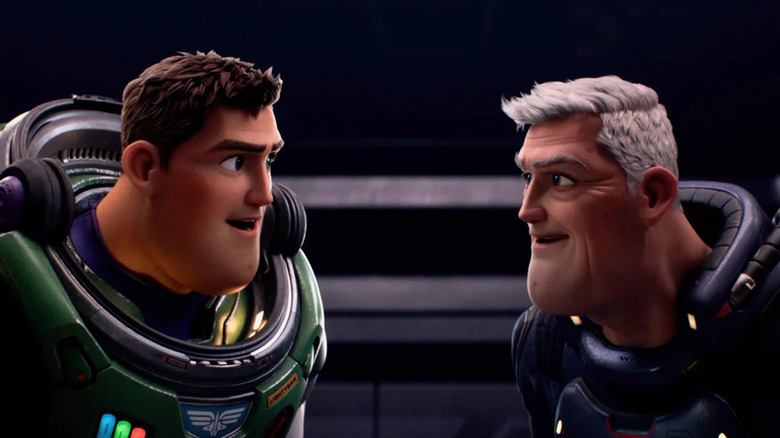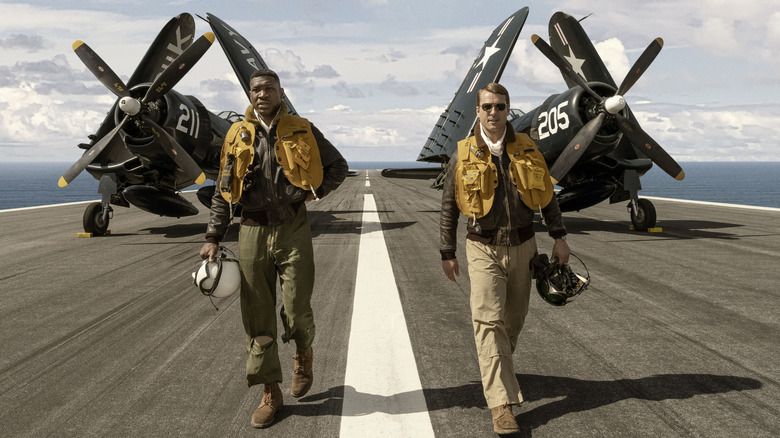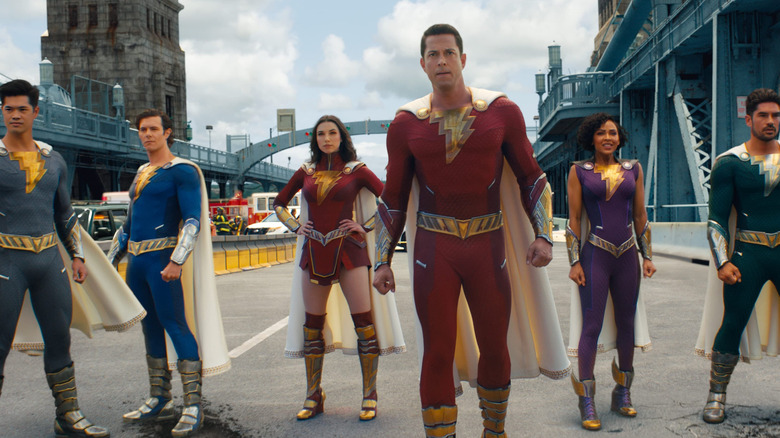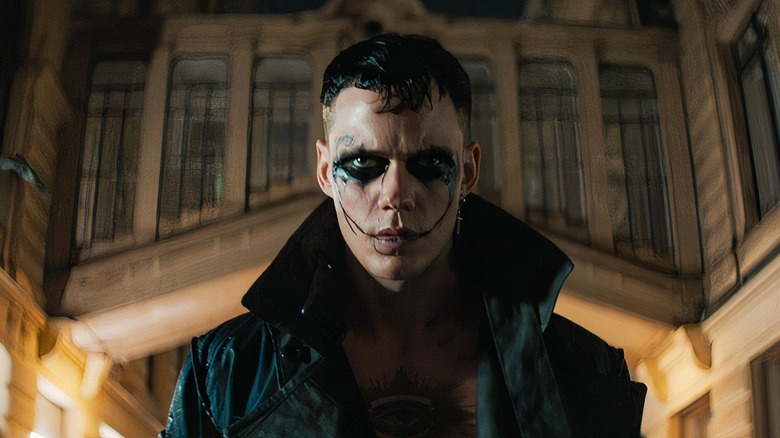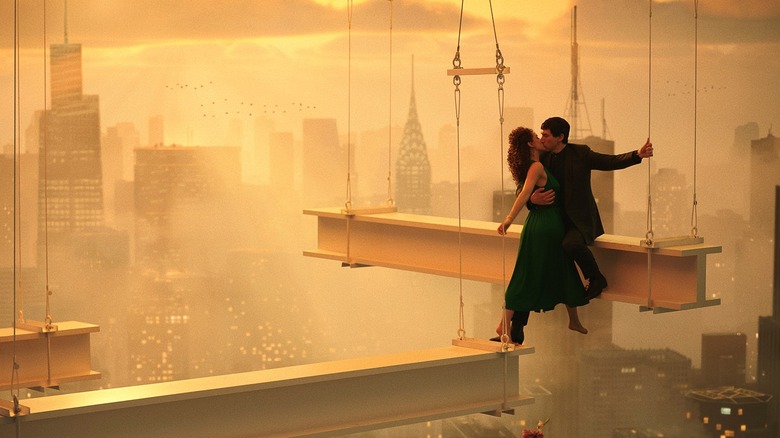Box Office Bombs That Everyone Saw Coming
We may receive a commission on purchases made from links.
Studios don't spend tens or even hundreds of millions of dollars on movies they don't think are sure things. Still, every year, eight and nine-figure projects bomb, sometimes taking down actors' reputations or even entire franchises with them.
This is especially true in today's entertainment industry landscape. Since many independent and small-to-mid-budget movies either go straight to streaming or wind up there shortly after their theatrical runs, studios sometimes take huge gambles on titles they hope will play in movie houses for weeks or months at a time. For most mainstream feature films, price tags north of $100 million are common, and after the cost of marketing, the average blockbuster needs to clear near half a billion or more just to make a profit.
Sometimes, a seemingly-anticipated movie's failure comes out of nowhere. The fault can lie in a bad idea, bad execution, bad business (particularly bad marketing), or bad luck. Some box office bombs are either adaptations or remakes of existing material. Others started out with bloated budgets and still ran out of time and money. Then there are others who suffer because of an unfortunate title, trailer, or poster. More often than not, multiple factors lead to a film's economic failure. Below are some famous trainwrecks that studios should have seen a mile away.
Aeon Flux
The live-action adaptation of MTV's groundbreaking animated series "Aeon Flux," with Charlize Theron in the title role, arrived a full decade after the last episode of the show aired. Already facing that formidable uphill battle, the film was shuffled around through multiple regime changes at Paramount. Studio head Sherry Lansing initially told director Karyn Kusama ("Girlfight") that she wanted it to be Paramount's answer to "Blade Runner"; incoming chief Gail Berman wanted more of a "Buffy the Vampire Slayer" vibe.
After struggling through the shoot with unclear directives, Kusama then endured the ultimate insult as a third incoming administration removed her from the post-production process — and, in her words, "eviscerated" the film. About 25 minutes was sliced from Kusama's cut, resulting in a barely coherent movie; Kusama would later note to DGA Quarterly, "What they didn't realize is that sometimes a cohesive 100 minutes will feel much shorter than an incoherent and barely comprehensible 82."
Paramount's failure to trust Kusama doomed the project before it even hit screens, and it predictably garnered appalling reviews and anemic box-office. Theron saw it coming too: in an interview with Variety, she recalled, "I was never completely sold on the entire concept, but I really loved ['Girlfight']. So, I threw myself into that with the belief that she's a great filmmaker. And then we [messed] it all up."
The Adventures of Pluto Nash
One of the more puzzling films ever made, it's a wonder "The Adventures of Pluto Nash" was released at all. The story of a space smuggler who bails out the indebted owner of a nightclub located on the Moon, it was in development for an unreasonably long time — the original script was written in the '80s and worked over countless times by a long line of script doctors until it was finally deemed acceptable and shot with an all-star cast and Eddie Murphy in the title role, wrapping production in 2000. Then it sat on a shelf for two full years before its release.
Warner Bros. claimed that the delay was in the interest of getting the special effects just right, but upon the film's release, it was obvious that this was baloney; "Pluto Nash" is simply one of the worst movies ever made.
The film's long and troubled production history would have raised red flags even if Murphy hadn't been well into the "sleepwalk through everything" phase of his career. The endlessly toiled-over script contained nothing resembling interesting characterizations, a unique plot, or jokes that were actually funny, and no amount of expensive special effects could paper over Murphy's plain disinterest in the film. The $100 million production didn't even crack $10 million at the box office worldwide, and Warners learned the valuable lesson that obvious turkeys don't improve with age.
Battlefield Earth
Much has been written about Mother of All Flops "Battlefield Earth" in the years since its release, but it's interesting to note that the producers of the 2000 film — based on a novel by Church of Scientology founder L. Ron Hubbard — seemed to exist in an alternate universe where Scientology wasn't facing a crippling PR crisis.
The church's public image had taken a serious hit in the '90s, with information beginning to leak about its creation story and an alleged habit of destroying the lives of former members and "suppressive people," and there was significant controversy when it succeeded in getting the IRS to declare it an official religion and, therefore, tax exempt. In a retrospective piece for A.V. Club, critic Nathan Rabin summed up the public attitude toward the film prior to its release nicely: "'Battlefield Earth' hit theaters with a 'Kick Me' sign on it so massive it could be detected from outer space."
Even if the film had been good, it would have faced severe public skepticism due to its ties to Scientology — but with its utterly confusing script, amateurish cinematography, and cringeworthy acting highlighted by the most ridiculous performance of John Travolta's career (which all but ended it), it became a boondoggle of historic proportions. All these years later, it's still often pegged as one of the biggest flops ever, an outcome that was never really in doubt.
Cowboys and Aliens
Jon Favreau's "Cowboys and Aliens" seemed like the kind of high-concept romp that the right filmmaker could knock out of the park, and fresh off the success of "Iron Man" and its sequel, it seemed to have the right director in place. With Steven Spielberg as a producer and an all-star cast including Daniel Craig and Harrison Ford, DreamWorks and distributor Universal were predicting big things for the picture — but they should have paid a little closer attention to that writing on the wall.
For one thing, the script was labored over by more than a dozen writers for 14 years, which is never a good sign. For another, many observers assumed by its title that the 2011 film would be a comedy, rather than a straight-faced action outing (it wasn't), and it tracked consistently poorly among its target audience for the duration of its months-long, multi-faceted, very expensive marketing campaign.
It just barely managed to edge out "The Smurfs" in its first week of release, and followed that performance with a precipitous drop which resulted in its failing to make back its production budget domestically. "Cowboys and Aliens" certainly had a wealth of talent on either side of the camera, but everyone involved forgot the crucial step of making sure they were crafting a picture people actually wanted to see.
Fantastic Four
Production problems are a pretty reliable indicator that a big-budget tentpole film could be in trouble, and few have had production issues as extensive and varied as 2015's "Fantastic Four." From questionable casting to clashes between director Josh Trank and producer Simon Kinberg to Trank's unpreparedness for such a large-scale production, rumors flew fast and furious about the snafus plaguing "Fantastic Four" for months before the film's release.
Trank and Kinberg publicly shot down these rumors, claiming that everything was just fine and scolding the "unfair" treatment of Trank — but then the film hit theaters, and it became astoundingly clear that every single rumor had been true, and then some.
Audiences stayed away in droves, and those who gave it a chance largely wished they hadn't. In the wake of the hostile reviews, Trank defended his work via Twitter by implying that the studio had savaged the film in editing, saying, "A year ago I had a fantastic version of this. And it would've received great reviews. You'll probably never see it." As for Kinberg, he ignored the film's troubled production history by placing the blame for its failure on its tone, proving that some people fail to learn lessons even when they're taught the hard way.
John Carter
Disney's "John Carter" seemingly had a lot of things going for it. It was an adaptation of the first in a series of novels by Edgar Rice Burroughs (also the creator of Tarzan) which had been a towering influence on pop culture staples such as the "Star Wars" and "Avatar" franchises; it was helmed by Andrew Stanton, director of beloved Pixar outings "Wall-E" and "Finding Nemo"; and it had the type of ridiculously huge production budget one would expect for a tentpole film.
Any or all of these things would have been brilliant to play up in the film's marketing — so of course the first trailer capitalized by mentioning exactly none of them. The teaser appeared in July 2011, and it wasn't until the 2012 Super Bowl that a second trailer was released. Unfortunately, it wasn't much better, and in the interim the film had become something of a joke among the moviegoing public. Speaking with Vulture, an anonymous former studio executive called the "John Carter" marketing campaign the worst in history, saying, "It's almost as if they went out of their way to not make us care."
Amazingly, the problem was compounded by Stanton's familiarity with (and complete loyalty to) the source material — he called Burroughs' novels "my Harry Potter" — and his apparent assumption that the public at large adored John Carter as much as he did. This colossal miscalculation, plus the vague marketing campaign, equaled zero butts in the seats, as "Carter" became far and away the biggest flop of 2012.
King Arthur: Legend of the Sword
The legend of King Arthur has gotten its fair share of cinematic portrayals, but in recent years, the well-worn story hasn't exactly been fodder for box office gold. Director Antoine Fuqua's 2004 effort "King Arthur," the first attempt of the new millennium to attempt to cash in on the legend, was a significant flop — but that didn't stop Guy Ritchie from taking a stab at it with 2017's "King Arthur: Legend of the Sword."
Ritchie certainly had a decent level of name recognition, and star Charlie Hunnam was coming off a great seven-season run on the AMC television series "Sons of Anarchy," but there were a few problems that made Hollywood prognosticators rightfully nervous before its release. First, Ritchie's cheeky, rapid-fire style didn't exactly seem like it would be the right fit for a sword-and-sorcery epic. Hunnam, while a fine actor, looked a bit out of place in the title role, and the film's trailers portended doom, featuring a great deal more witty banter and bad CGI than one would expect from a retelling of the Arthurian legend.
All signs pointed to a potentially huge misfire, and studio Warner Bros. didn't help matters by scheduling the film to open against Marvel's highly-anticipated "Guardians of the Galaxy Vol. 2" in only its second week. Observers predicted that "Arthur" would pull less than half of what the studio was expecting its opening weekend haul to be — and they were right. The $175 million production failed to even crack $40 million domestically.
The Lone Ranger
When Disney's live-action "The Lone Ranger" was announced in 2010, it was not at all clear whether audiences were even up for a retelling of the adventures of the Western hero so popular generations prior. More recent adaptations of the property had traditionally not fared very well, and while Gore Verbinski (of the "Pirates of the Caribbean" series) was tapped to direct, a few feathers were ruffled over the choices of Armie Hammer in the title role and the dubiously-Native American Johnny Depp as sidekick Tonto.
The production was briefly shut down over budget concerns in 2011 — never a good sign — but managed to get back on track. Then, in early 2012, fans were treated to the first production stills, featuring Hammer in the famous mask ... and Depp in the most egregiously terrible Tonto makeup anyone could have imagined.
The images quickly drew jeers and charges of racism, giving observers plenty of negative things to talk about before the film was finally released in July 2013. It failed to generate any significant positive social media buzz, and analysts correctly predicted that the film would be trounced by "Despicable Me 2," which opened the same weekend and went on to gross nearly a billion dollars.
Pan
2015's "Pan" was billed as "the story of how Peter got to Neverland." It wasn't necessarily clear that anyone cared how he got there, but Warner Bros. envisioned the film as a launchpad for a new, kid-friendly franchise that could rake in the family moviegoing dollars for years to come. Unfortunately, it wasn't tracking well with family or general audiences prior to its release, and competition from surprise hit "The Martian" (in its second week) and "Hotel Transylvania 2" had observers concerned that the $150 million production might fail to live up to expectations. It was predicted that the film would score only $20 million or so in its opening weekend — but it couldn't even hit that number.
Poor reviews dissuaded even those who might have been inclined to take a chance on a new Peter Pan story, and by the end of its run "Pan" just barely cracked the $35 million mark at the domestic box office. With an advertising spend even heftier than its production budget, it was one of the biggest money losers of the year, with some estimates suggesting that Warners lost up to $100 million on the picture.
Cutthroat Island
For years, swashbuckling epics had been notoriously risky propositions; 1995's pirate romp "Cutthroat Island" would so notoriously kill the genre that Hollywood wouldn't go near it again until "Pirates of the Caribbean" series came along about a decade later. According to director Renny Harlin, who discussed the picture's failure in an interview with radio station KCRW (via Slashfilm) years after the fact, studio Carolco was broke and distributor MGM was in trouble before the film even went into production — which Harlin knew would mean a nonexistent advertising budget.
"At that point I was left there with my then-wife, Geena Davis and myself, and a company that was already belly-up," Harlin recalled. "We begged to be let go. We begged that we didn't have to make this movie. And I don't think I've ever said this in any other interview. We begged that we not be put in this position." He went on to elaborate that Davis was "terrified" of headlining the film, knowing full well that a female-led pirate movie was "suicidal," but that due to contractual obligations they had no choice but to play ball. The film went on to gross a 10th of its $100 million budget, and — as Harlin now insists he knew all along — it was the last picture Carolco would ever make.
Land of the Lost
In 2009, Will Ferrell was at the height of his comedic powers, having just starred in "Step Brothers" the year before and "Talladega Nights: The Ballad of Ricky Bobby" and "Anchorman: the Legend of Ron Burgundy" not long before that. Until that point, most of Ferrell's material had been original. But he was a longtime fan of the somewhat obscure Sid & Marty Krofft '70s Saturday morning show "Land of the Lost," and the pull of nostalgia can be strong. When the "Saturday Night Live" alum signed on to star in a remake that he neither co-wrote nor co-produced, it was something of a career pivot.
While Ferrell was on fire as a leading man, "Land of the Lost" wasn't a particularly hot piece of intellectual property. Having been on the air some 40 years prior and never really building that passionate a fan base in the first place, people weren't exactly clamoring to see the 2009 update. The TV series, about a family who gets time warped to an alternate universe where dinosaurs still exist, was decidedly low-tech and aimed squarely at children. The feature film version attempted to target the adult demographic that had been flocking to Ferrell's movies and relied heavily on (noticeably shoddy) CGI.
From the moment the trailer dropped, the tonal differences were painfully obvious; both adults nostalgic for stop-motion creatures and fans of Ferrell's comedies were confused. "Land of the Lost" lost Universal about $80 million and marked a downturn in Ferrell's movie star trajectory.
Mars Needs Moms
There was a time when the name Robert Zemeckis was up there with the likes of George Lucas and Steven Spielberg. The director of such classics as "Back to the Future," "Forrest Gump," and "Cast Away" then fell in love with the possibilities of computer-generated imagery (or CGI). His fascination with the technology/art form made sense; Zemeckis was an early adopter of similar innovations on "Who Framed Roger Rabbit?," but aside from 2004's "The Polar Express" (which made good box-office but to this day remains infamous for its creepily lifeless animation), his big-budget CGI takes on "Beowulf" (2007) and "A Christmas Carol" (2009) debuted and disappeared quickly from theaters.
In 2011, Zemeckis produced "Mars Needs Moms," with protege Simon Wells writing and directing. But when it came to the uncanny valley factor, the off-putting effect was the same. This late in the CGI game, there was really no excuse for the motion capture animation in "Mars Needs Moms" to look so ugly and unsettling. James Cameron's "Avatar" had wowed audiences two years earlier, and other breakthroughs had taken the medium a long way since "Polar Express."
Ticket buyers didn't connect with the title, the story, or the central characters. In a post-mortem, studio executives concluded that boys weren't interested in a movie about mothers, while younger children may have been scared off by the premise. "Mars Needs Moms" became one of the biggest box office bombs of its time, making less than $40 million worldwide, resulting in a loss of more than $100 million.
Billy Lynn's Long Halftime Walk
Ang Lee has a track record that would give any studio confidence. He has three Oscars, including two for best director, and his films — like "Crouching Tiger, Hidden Dragon" and "Life of Pi" — tend to do well enough financially and extremely well critically. Lee is known for working across myriad genres and experimenting with new technologies, so it wasn't that much of a surprise when he took on a literary adaptation of a war drama and attempted to film it in a novel format. Unfortunately, "Billy Lynn's Long Halftime Walk" became a rare double miss for the celebrated filmmaker: reviews weren't kind and audiences didn't come. In fact, the movie only made about $1.7 million domestically against a $40 million budget.
What went so wrong? Two major problems plagued the 2016 film from the start. While the source material — about a group of soldiers returning from service in Iraq — did receive some acclaim, it didn't enjoy high name recognition among the general public and the title did a poor job of communicating to audiences what the movie was about.
Secondly, there was a high barrier to clear if audiences wanted to see the film the way Lee intended. It was shot to be projected in 3D, in 4K UHD resolution, and at an extremely high frame rate of 120 frames per second on the largest possible screen. Since few theaters can accommodate those specs (only two in America could show the film in its full glory), viewers likely skipped it at their regular local multiplex. A lack of A-list talent, and lackluster word of mouth, didn't help.
Monster Trucks
Plenty of movies have been, at least at the point of their origin, a cynical cash grab based on the popularity of a toy. For generations, kids have played with Monster Trucks... those big wheeled vehicles built on exposed chassis, often sporting bodies that resemble, say, a bull, a shark, or even the iconic ride of a superhero. Sold in miniature under the Hot Wheels brand by Mattel, Monster Trucks also tied into the touring live competition and stunt show, Monster Jam. When Paramount announced they'd be releasing a movie titled "Monster Trucks," gear-headed kids and their families assumed they knew what to expect.
But there isn't a brand connection between 2016's "Monster Trucks" and Monster Jam or Hot Wheels, which became clear immediately after folks saw the trailer. Instead of Gravedigger or El Toro Loco, this was a movie about a truck that had an actual monster in it, and not a very scary or interesting-looking one at that.
The film's "Creech" resembled a kawaii shark's head with octopus-like tentacles, and sustained itself on motor oil. Potential audiences were stumped by and disinterested in the whole concept. Paramount had wanted to repeat the success of its "Transformers" franchise, assuming "Trucks" would appeal to boys while generating sequels, toys, and other merch. But the response to the trailer — equal parts generic and strange — was so bad, executives admitted they expected to take a $115 million hit before the movie even came out.
Cats
The Andrew Lloyd Webber musical "Cats" was a record-breaking hit on Broadway, where it ran from 1982 until 2000. But because "Cats" made so much money (over a billion dollars) in one format, executives at Universal were willing to bet that it could do it again. Never mind that musical adaptations had been struggling in the decades since "Chicago" had raked in 10 times its budget and won best picture. And never mind that "Cats" was thought to be among the trickiest Broadway smashes to adapt.
Tom Hooper (the man behind the 2012 film version of "Les Misérables") signed on to direct, and a star-studded cast was assembled that featured everyone from Jason Derulo and Taylor Swift to Idris Elba, Judi Dench, and Ian McKellen. Fans of the musical sensation wondered how realistic the "Cats" movie would be (the stage show simply isn't). Then, about five months before the film was set to premiere in 2019, a trailer gave those fans their first glimpse of the titular animals, and many were horrified by what they saw.
These cats — Macavity, Old Deuteronomy, Mr. Mistoffelees — were disturbing human-feline, CGI-live action hybrids. It was too late to change course. Audiences hoped for a movie that might be so bad it could rise to the level of camp pleasure. Unfortunately, the pandemic derailed any possibility of rowdy, ironic screenings; "Cats" never recouped its cost.
The Call of the Wild
Jack London's trim but powerful 1903 novel "The Call of the Wild" is required reading at middle schools all over America. An anthropomorphic, allegorical story about a hulking mixed breed dog who must evolve from beloved pet into fearsome pack leader in order to survive, it has been adapted for the screen multiple times, but isn't exactly the type of story that lends itself to straightforward cinematic retelling.
For one thing, there isn't much of an overarching, linear narrative to the journey of the dog, named Buck. For another, it's told entirely from the perspective of the big mutt, while other characters — humans and canines — simply pass through. Despite the fact that it's so regularly assigned to children, "The Call of the Wild" is also unceasingly brutal. It's basically 200 pages of dogs ripping each other apart ... not the best choice for what 20th Century Fox (which was shortly thereafter acquired by Disney) intended to be a big budget, family-friendly Christmas release.
The original, densely literary novel aims to claw away at the facades of civilization and capitalism, revealing the grim, nihilistic truth underneath. From the trailer, fans of London's could tell they were getting a sanitized version, while the general public wasn't exactly begging for yet another remake of a 120-year-old book. Harrison Ford was between reprising his roles in "Star Wars" and "Indiana Jones" and was very much back in the zeitgeist. But the real stumbling block was Buck, a far-too-blatant (and expensive) CGI creation that undermined the entire effort. In the end, the studio took a roughly $50 million ice bath on 2020's "The Call of the Wild."
Dolittle
One could argue that Robert Downey Jr. was the biggest movie star in the world at the end of 2019. He was the centerpiece of "Avengers: Endgame," the extraordinarily profitable capstone to the first three phases of the Marvel Cinematic Universe, and audiences couldn't wait to see what he would do with his post-MCU career.
First up for Downey Jr. was 2020's "Dolittle," ostensibly a family film based on the second of author Hugh Lofting's "Doctor Dolittle" books. That "Dolittle" had been delayed until January (a time when studios typically dump what are predicted to be losers) was worrying. Still, Downey's Jr.'s presence and the stellar voice cast (Emma Thompson, Tom Holland, Selena Gomez, and Ralph Fiennes, just to name a few) gave Universal and audiences reason to hope.
But the trailer seemed to confirm everyone's worst fears. Viewers couldn't help but notice that Downey Jr.'s accent was, to put it mildly, a bit odd. If the best jokes were in the trailer, they caught wind of the fact that the film's sense of humor might fall flat. The expensive CGI-heavy visuals also didn't do much to inspire a sense of wonder in prospective audiences. In short, "Dolittle" looked to be a disappointment. Once critics and families got to see the final product, word got out about just how bad it was. "Dolittle" made $251 million dollars, but it was so pricey to produce and market that it still ended up costing Universal money.
Dear Evan Hansen
Not two years after "Cats" crashed and burned, Universal tried again with the contemporary Broadway musical "Dear Evan Hansen." The play, about a high school student struggling with mental illness, had gained a loyal following, thanks in part to catchy music penned by Benji Pasek and Justin Paul of "The Greatest Showman" fame. Rather than wait two decades, Universal got to adapting "Dear Evan Hansen" so immediately, the same actor who'd originated the role in New York was set to reprise it for the forthcoming film. But once the trailer aired, even those loyal fans began to doubt that the 27-year-old Ben Platt was the right choice to portray 17-year-old Evan.
It wasn't just that Platt had aged four years (he was 23 during the show's Broadway run); it was how he was styled and how differently the character came off in those intimate close-ups. What had seemed emotionally honest on a proscenium stage suddenly seemed cringy when translated to the screen, leading to a backlash that Platt had a difficult time digesting.
There was also the matter of what "Dear Evan Hansen" was about. Broadway shows only have a single theater's worth of seats to fill, but the movie had to sell tickets at more than 3,000 cinemas across the country. Bad buzz out of the Toronto Film Festival, where it premiered, didn't do it any favors. Neither did confusion about what "Dear Evan Hansen" was really about (everyone seemed to wrongly assume homosexuality). The curtains closed early on the film adaptation of "Dear Evan Hansen," which made a paltry $17 million worldwide in its three weeks of wide release.
Lightyear
Back in 1995, the artists and storytellers at Pixar dreamt up a simple but satisfying premise for a children's movie: What if toys came to life when we weren't looking? That premise spawned four well-received films, one of which — "Toy Story 3" — was even nominated for best picture at the Academy Awards. The franchise's dynamic duo, Woody and Buzz, became icons. Then Disney announced a fifth film focused on the latter that complicated the original premise so thoroughly and unnecessarily that fans literally didn't understand what the studio was trying to do.
Adding to the confusion was the fact that Chris Evans, as opposed to Tim Allen, would be voicing the character. This change alone angered some, who speculated that Allen had been passed over because of his political beliefs (he wasn't). Evans tried to do damage control, tweeting, "Just to be clear, this isn't Buzz Lightyear the toy. This is the origin story of the human Buzz Lightyear that the toy is based on." But that turned out not to be true, either.
2022's "Lightyear" wasn't about a toy astronaut that doesn't realize he's a toy astronaut, nor was it about a fictional but supposedly real astronaut from Andy's world. Even after trailers dropped and announcements were made at Disney Investor Day and CinemaCon, prospective audiences were still scratching their heads. It took a title card tacked to the beginning of the film to finally clear things up, which read: "In 1995 Andy got a toy. That toy was based on a movie. This is that movie." But by then, audiences had already lost interest in "Lightyear."
Bros
Not so long ago, an R-rated romantic comedy — especially one produced by Judd Apatow — could do well enough at the box office to justify its existence. By and large, that time has passed. It's been an eternity since a comedy, let alone a rom-com, has landed in the top 10 highest grossing films of the year. The last one to do so was 2011's "The Hangover: Part II," and the last true comedic romancers to break that ceiling were 2005's "Wedding Crashers" and "Hitch."
Suffice it to say, the odds were stacked against 2022's "Bros" from the start, but they were stacked even higher because it was the first major studio rom-com centered around a gay couple. After "Bros" fizzled out, co-writer and star Billy Eichner infamously took to Twitter to express his displeasure, blaming homophobia for his film's poor performance. While there could be some truth to his theory, given the current political climate ("Bros" may have been review bombed on IMDb but wasn't on Rotten Tomatoes), it likely underwhelmed for reasons in addition to its potentially controversial subject matter.
While Eichner had fans from his Funny or Die show "Billy on the Street" and from his time on "Parks and Recreation," he wasn't as familiar to a broader audience. Nor was his co-star and love interest, Luke McFarlane, best known for appearing in Hallmark movies. Also, there wasn't any urgency to see it on the big screen; "Bros" was available to stream within days of its release.
Devotion
2022's "Devotion" came and went with so little fanfare, most people probably don't know it exists. That, in and of itself, is a catastrophe for a war movie with a $90 million budget that was at one point thought to be an Oscar contender. In an alternate universe, this Korean War drama based on the real-life friendship of two naval officers — one white and one Black — could have been a commercial and critical hit.
Had it been promoted more wisely, the movie could have glided to relevance and profitability on the winds of the year's other big airplane flick, "Top Gun: Maverick." The two patriotic, feel-good films even shared a star in Glen Powell. Its other lead, Jonathan Majors, was a star on the rise. But even though "Devotion" dropped before Jonathan Majors' arrest cast a cloud over his future, it still never got off the runway. The film barely cleared $20 million in ticket sales and, after an auspicious start on the festival circuit, came up empty-handed during Oscar season, too.
So why did the "Top Gun" sequel take off while "Devotion" stayed grounded? The former was among the most anticipated releases of the year, having been delayed multiple times during the pandemic. It had name recognition, perhaps the most recognizable celebrity in the world, and a phenomenal trailer that practically guaranteed it would be a crowdpleaser. Comparatively, there was little to no hype for "Devotion," whose leading men weren't quite yet household names. One Reddit user commented that it looked like the dollar bin version of "Top Gun: Maverick." Another mistook it for a religious movie, based on its vague title.
Shazam! Fury of the Gods
While the DCEU never found the same level of consistency as the Marvel Cinematic Universe, 2019's "Shazam!" was a bright spot. It got better than decent reviews, made solid money, and — compared to the often dour films about Superman and Batman — was charming in a way that some of the best MCU movies had been. Of course, there was going to be a sequel. As was the case with the majority of films that went into production in 2020, the pandemic caused stops and starts. Nevertheless, fans remained optimistic since star Zachary Levi and director David F. Sandberg were both returning.
Then, Warner Bros. announced that it had hired James Gunn and Peter Safran to reboot its DC comics universe, which meant "Shazam! Fury of the Gods" no longer felt like it had a place in the universe's overall continuity. Another strike against the "Shazam" sequel? "Black Adam." The Dwayne Johnson vehicle should have tied into the "Shazam" storyline, since the characters are so closely connected in the comics. Instead, Johnson interfered in a way that torpedoed both films and Warner Bros. ended up with not one but two box office bombs on their hands.
"Shazam! Fury of the Gods" never captured the previous film's magic, lost the original's lighthearted tone, and poor word of mouth and bad marketing ultimately extinguished Shazam's flame. Reviews weren't quite as gut punching to Zachary Levi as they were to Dwayne Johnson, but they weren't good. "Shazam 2" became an afterthought of a movie that few people felt the need to see.
The Crow
"The Crow" is a reboot of the original movie released in 1994, with both movies adapting James O'Barr's 1989 comic book series. The first film had to be finished after star Brandon Lee died during filming, becoming an indelible cult classic as a result, which is one of the main reasons why "The Crow" failed in 2024 — the pre-established fanbase wasn't interested in seeing a new take on such a beloved yet haunted film. As a result, "The Crow" was a box office bomb, making only $24 million off a production budget of $50 million.
Not only did "The Crow" fail to make anywhere near the studio and distributor's sizable investments back, but it was also shredded by critics. The film sits at 22% on Rotten Tomatoes, where the critics' consensus indicated that the movie had pacing issues and little that justified a reboot. The fans were kinder, pushing the Popcornmeter's rating to 63%, but the original film fared far better, and there's no comparison between the two.
Since 2024's "The Crow" is a modern reboot, it takes the themes, characters, and many of the events from the comic series and brings them forward to the 21st century. The movie does this well enough, but the insurmountable goal of coming close to the original in terms of popularity and performance was folly. Ultimately, "The Crow" was doomed to fail, but it has some merit, so the film may perform better on streaming platforms.
Madame Web
While Sony killed it with Sam Raimi's "Spider-Man" trilogy and the animated "Spider-Verse" films, its Spider-Man-adjacent movies have been more miss than hit. That's certainly true of "Madame Web," which took a handful of characters from Spidey's world and threw them onto the silver screen without a recognizable link to the comics. That's a bold and dangerous move, seeing as Spider-Man is one of the most popular comic book characters of all time, with a pre-existing fanbase of millions and millions of people.
It seems "Madame Web" disregarded this fact and plowed through with a movie so universally loathed that its bad word of mouth drew few people to the theater to watch it. The film made a little over $100 million, which is a lot of money, but unfortunately far below the $80 million production's break-even point, which might have been as high as $200 million. The math didn't work in the movie's favor, costing Sony millions.
Sony planned to create a new franchise around the movie, but its failure put a stop to that. In the end, "Madame Web" was doomed to flop for a few reasons, but primarily, it wasn't a good movie. The people who saw it derided the film, which suffered from wooden characters, cheesy dialogue, a predictable plot, and more. It's no wonder "Madame Web" sits at 11% on Rotten Tomatoes, as it's objectively a terrible adaptation of Marvel characters and ultimately a bad movie.
Megalopolis
"Megalopolis" was a labor of love and passion project from writer-director Francis Ford Coppola. It took Coppola years to make the film, and its production was a chaotic mess. This generated significantly bad press for the movie and its director, which didn't garner a lot of viewer interest in "Megalopolis." Coppola began working on the project back in the 1970s, and it languished in development hell for decades. That's never a good sign for a movie's ultimate quality, so few were surprised when "Megalopolis" bombed at the box office.
The film cost Coppola, who independently financed it, $120 million to produce. When all tickets were counted, the film managed to rake in $13.7 million. Coppola's magnum opus was a commercial catastrophe, and it didn't fare well with critics or audiences, scoring 46% on Rotten Tomatoes' Tomatometer and 35% on the Popcornmeter. A grand epic, "Megalopolis" is visually beautiful, but it suffers from pacing problems, unrelatable characters, and a disjointed storyline.
Perhaps the biggest reasons for the film's failure were all the controversies surrounding its production. A trailer with made-up negative reviews of Coppola's films was a marketing disaster; screenings resulted in poor reactions prior to release, Coppola lashed out at the media, and he was alleged to have behaved inappropriately toward scantily clad women on set. None of this helped bring viewers to theaters, and the performance of "Megalopolis" at the box office was perhaps only surprising to one person: Coppola himself.
